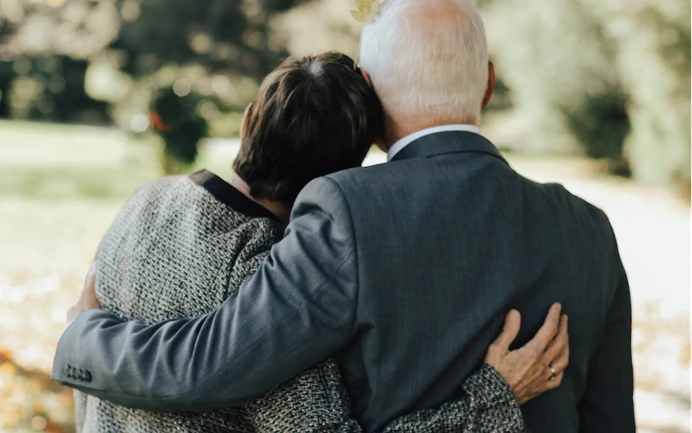
What If A Loved One Doesn't Want A Funeral?
By: Tom Harries
Apr 01, 2022 | End-of-life Logistics
4 min readA funeral service is an event which takes place in the presence of a body before burial or cremation. It gives family and friends the opportunity to view their loved one, as well as to share memories from their life.
Funeral services are a tradition for many families and cultures. However, there are many reasons why someone might not want to include one in their end-of-life planning and why some families may choose an alternative when the time comes.
These reasons include the expense of a funeral, cultural shifts, simple personal preference, and the appeal of other options.
This article looks at the alternatives to funeral services. It explains what needs to be done when a loved one dies, even if there is to be no funeral. The article also explains how soil transformation is an appealing process for those who would prefer to opt out of a traditional funeral.
What Must Be Done When A Loved One Dies?

There are certain steps that must be taken when a loved one dies, regardless of whether there is to be a funeral service or not. Highlighting what these steps are will help an individual understand what deciding against a funeral involves.
- Report the passing - a person’s passing must be reported to the authorities. If a person passes at home, this should be done by contacting the hospice if relevant or by calling the authorities at 911 or the non-emergency line
- Contact a funeral home - even if there will be no funeral service, a funeral home will be able to help with transportation, storage and preparation of the body, private viewing, and more general funeral arrangements that don’t involve organizing a service
- Inform friends and family - in the absence of a funeral service, you may wish to meet with family and friends to celebrate your loved one’s life in more informal settings
- Alternative arrangements - traditional funeral alternatives will still require organization, which may be something you can arrange with the funeral home
- Memorialization - you can consider how to memorialize your loved one, which will depend on the alternative arrangements you decide upon
- Attend to estate matters - you will need to locate your loved one’s will and work out who is to be in charge of administration. In the absence of a will, you will need to work on closing down the estate
Alternatives To Traditional Funerals
Below are funeral alternatives which might appeal to someone who wishes to opt out of a traditional service.
Direct Disposition
Direct disposition is a popular alternative nowadays, and interest in the option is growing. Direct cremation is the most common form, but immediate burial is another option.
With these options, the disposition process takes place in the days immediately following the death, and there is no viewing or service.
Direct disposition is popular for multiple reasons. The process is convenient and easy relative to traditional funerals, reducing planning and emotional burden. It is also a substantially cheaper option, with the average traditional cremation funeral costing about $7,000 and direct cremation costing $2,400 on average.
These choices also allow for a more personalized service at a later date, which is more appealing to many than a traditional funeral service. Families and friends can organize a fitting celebration of life at a less difficult time.
Get a quote in seconds.
Private Burial/Cremation
Another option is a private burial or private cremation. These are very small events where only the closest family members and friends attend the burial or cremation process.
These options would usually be attended by some combination of the loved one’s spouse, children, parents and close friends.

Private cremation is often referred to as a witnessed cremation. The family views their loved one’s body prior to the cremation and may choose to witness the body going into the cremation unit.
These events may resemble a very small funeral service. They would not be announced by the family or funeral home as a public event for others to attend. They would typically be less expensive, require less organization and suit someone who wishes to keep proceedings simple and private.
A Casual Memorial Service
A memorial service is not the same thing as a funeral service. While they are in many ways similar, memorial services take place at a later date without the body present. These services sometimes take place with an urn present instead.
Memorial services or other celebration of life events may take place shortly after passing, as is often the case when an alternative to traditional burial or cremation is chosen. They may also take place a long distance into the future.
This option could be less expensive than a traditional funeral service, though cost can scale with desire and available budget. The greater flexibility as to timing can make organization much more simple and stress free compared to a traditional service. This also allows for greater personalization, with family and friends having more choice over venue, themes, tone and activities.
Importantly, this option allows for alternative funeral arrangements which do not lend themselves to a traditional funeral service.
Soil Transformation
Another alternative to traditional funerals is soil transformation. This is an environmentally friendly process, often referred to as natural organic reduction or human composting, that involves the gentle transformation of a body into nutrient-rich soil.
Soil transformation may be coupled with a traditional funeral service, or families and friends may choose to remember their loved one with a memorial service or other celebration of life.
At Earth, we provide soil transformation services. At the end of our 30 day process there is a cubic yard of healthy soil. Some of this is returned to the family and the rest is used for important conservation efforts.
The return of the soil offers an opportunity for a family to memorialize their loved one, whether by scattering it in a special place or using it to grow a plant or tree.
Read more about the soil transformation process and Earth’s services.
Get a quote in seconds.







